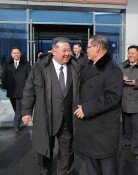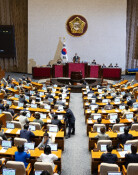U.S Has Limited Intelligence On North Koreas Nuclear Program
U.S Has Limited Intelligence On North Koreas Nuclear Program
Posted April. 01, 2005 23:27,
A report by the U.S. government has revealed that the U.S. knows disturbingly little about the North Korean and Iranian nuclear programs, as well as that the intelligence on the weapons of mass destruction (WMD) of Iraq that was obtained before the Iraq war in 2003 was almost all dead wrong.
The Committee for U.S. Intelligence Ability under the White Houses direct control, which is co-sponsored by the Republican and Democratic parties, revealed the above by adopting the final report of 600 pages on March 31.
The committee has asked U.S. intelligence and military authorities to find the reason behind the agencys judgment that Iraq developed WMD.
The evaluation report containing 11 items, including the status of the nuclear programs of North Korea and Iran, was not disclosed as it was classified as top secret. In the disclosed report, the part concerning North Korea and Irans nuclear programs was a half page in length. In addition, the committee thoroughly examined the intelligence communitys ability to collect intelligence and analyze the nuclear programs of North Korea and Iran.
Also, an additional explanation that the intelligence on North Koreas nuclear program, which was grouped into the top secret category, was limited, was presented. The report described that the U.S. has little information on its most hostile countrys missile program, and in particular, doesnt know its inner thoughts.
The committee said, without naming a specific country, that in some cases, we had even less intelligence than we had five or 10 years ago.
However, the committee assessed that U.S intelligence agencies had been successful in frustrated the international smuggling network of Dr. Abdul Qadeer Khan of Pakistan, and in bringing about the abandonment of the nuclear program of Libya by pressuring the country after identifying that countrys development of nuclear and chemical arms.
In the White Houses news conference and the Department of States regular briefing, reflecting the ongoing, insufficient intelligence on North Korea and Iran, many reporters asked, Is the current strategy of pressure on the North Korea and Iran based on the correct intelligence?
Regarding this, Richard Boucher, a spokesperson for the U.S. Department of State, said, If we include the case of Libya (a successful case of intelligence work), the whole picture will turn better.
Meanwhile, in a conference room, President George W. Bush said, I agree with the Committees main conclusion and think that the intelligence community needs a fundamental change. The U.S media reported, The Bush administration is trying to stress that the Iraq war started on the basis of falsely reported intelligence and was not an intentional distortion on their part.
Seung-Ryun Kim srkim@donga.com







